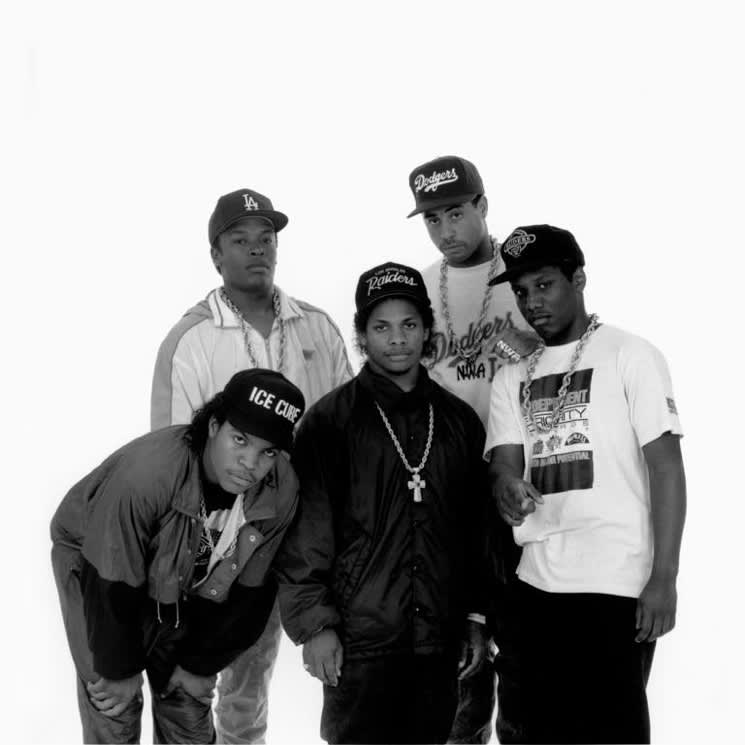Former N.W.A. manager Jerry Heller has had much of his $110 million defamation lawsuit against the surviving members of the rap group and the filmmakers of Straight Outta Compton tossed out in court, though the case is ongoing due to one potentially duplicitous implication in the film.
As previously reported, Heller had sued the producers of Straight Outta Compton, calling out actor Paul Giamatti's unflattering portrayal of him and the film's "false and damaging" plot points. He especially took offence to being presented as "a sleazy manager who took advantage of Eazy-E, Dr. Dre and Ice Cube." As TMZ points out, a federal judge did not fully agree and has now dismissed the bulk of the lawsuit.
That said, there is still one particular plot point captured in two of the film's scenes being questioned, wherein the film finds Heller (a.k.a. Giamatti) telling Ice Cube (here played by O'Shea Jackson Jr.) that lawyers "are paid to make trouble" and "create problems where none exists." The in-movie rapper later recalls this purported conversation to reporters.
It's unclear exactly what the new conditions of the case are, but the real Heller must now prove to a judge that this interaction with Ice Cube didn't happen, as well as prove that this was written into the script to defame him.
Heller's lawsuit was filed last fall, against Ice Cube, Dr. Dre, the estate of Eazy-E, NBC Universal and more. The surviving members rebutted Heller's claims, calling it a "hodgepodge of conclusory allegations and subjective interpretations."
"The 'Jerry Heller' character in the Film is not shown committing any improper or illegal actions, or even admitting that he had ever done anything improper," a motion from the defendants reads. "Rather, the Film depicts criticisms articulated by others about Plaintiff, which Plaintiff's own Memoir concedes had been very publicly leveled against him ... It is impossible to conceive of a serious docudrama exploring this history that would not depict these disputes, and the First Amendment protects the right of filmmakers to tell this story."
As previously reported, Heller had sued the producers of Straight Outta Compton, calling out actor Paul Giamatti's unflattering portrayal of him and the film's "false and damaging" plot points. He especially took offence to being presented as "a sleazy manager who took advantage of Eazy-E, Dr. Dre and Ice Cube." As TMZ points out, a federal judge did not fully agree and has now dismissed the bulk of the lawsuit.
That said, there is still one particular plot point captured in two of the film's scenes being questioned, wherein the film finds Heller (a.k.a. Giamatti) telling Ice Cube (here played by O'Shea Jackson Jr.) that lawyers "are paid to make trouble" and "create problems where none exists." The in-movie rapper later recalls this purported conversation to reporters.
It's unclear exactly what the new conditions of the case are, but the real Heller must now prove to a judge that this interaction with Ice Cube didn't happen, as well as prove that this was written into the script to defame him.
Heller's lawsuit was filed last fall, against Ice Cube, Dr. Dre, the estate of Eazy-E, NBC Universal and more. The surviving members rebutted Heller's claims, calling it a "hodgepodge of conclusory allegations and subjective interpretations."
"The 'Jerry Heller' character in the Film is not shown committing any improper or illegal actions, or even admitting that he had ever done anything improper," a motion from the defendants reads. "Rather, the Film depicts criticisms articulated by others about Plaintiff, which Plaintiff's own Memoir concedes had been very publicly leveled against him ... It is impossible to conceive of a serious docudrama exploring this history that would not depict these disputes, and the First Amendment protects the right of filmmakers to tell this story."




